#black british
Text

“You see two decks and mixer, but I see the bigger picture”
Skepta
306 notes
·
View notes
Text
look mate if you're making jokes about this it's not funny, it's not nice, youre a bit wank; I said it about the king and I'll say it again.
There is a ten year old, a seven year old and a four year old facing losing both their mother and their grandfather as they are forced into the spotlight again. They have to struggle in the spotlight and the prying eyes of the tabloids and the public like their dad did when his mother was taken away in his early teens. It's not funny. Even if the king was a dick or whatever, saying he deserves cancer is so scummy and saying Kate deserves it too for GETTING MARRIED is so scummy too. I am rather anti-monarchist but hating individuals and cheering as they may be dying by something they can't control is hardly praxis insomuch as it is cruel and unempathetic.
I just hope that Kate, Charles and the kids are okay, for the sake of all their mental healths. And for the love of god stop implying that cancer happens to bad people or that it should happen to bad people.
#kate middleton#king of england#king charles#king charles iii#princess kate#royal family#black british#black brit#cancer#i hope theyre both okay and i hope the kids are okay#british royal family#british royalty#uk news#uk#ukpol#uk politics
145 notes
·
View notes
Text
Anyways it's Black History Month in the UK so shoutout to the best companion of all time and first onscreen female black companion in Doctor Who's history:
Martha Jones played by the beautiful Freema Agyeman!

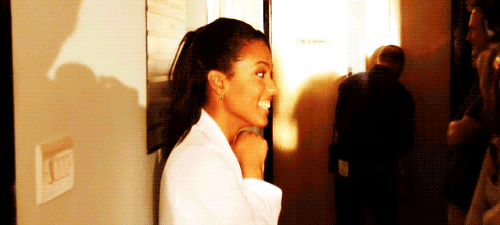
#doctor who#martha jones#tenth doctor#10th doctor#tenmartha#freema agyeman#david tennant#black history#black history month#black actors#black actresses#black british#murray gold#Spotify
133 notes
·
View notes
Text
Aaron Pierre arrives at the GQ Men Of The Year Awards 2023

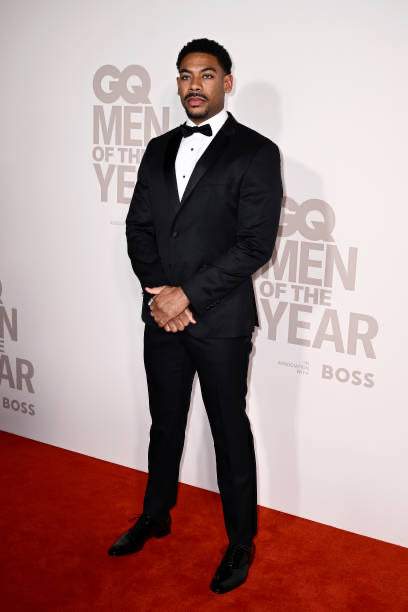
95 notes
·
View notes
Text
Part 2: Why is the accent? Where and when does Hobie come from?
Part 1: Who, What (London Accents) | Part 3: How (Writing Tips)
In this section, we'll touch on racism since the 70s, black Londoner youth culture and how punk has historically interacted with those things.
To begin, let’s answer the question of what the hell all us black people are doing here in the U.K. 😂
Long story short, after World War II, the U.K. invited subjects of the empire over, in need of help rebuilding the place and doing essential work after getting bombed and stuff. There was further incentive on the subjects’ side to come as many of their men had been sent off for the war but were out of work and not properly compensated upon their return, leading to a poor economy and many people hoping for better in the ‘mother country’. Caribbean people, mostly Jamaicans, came over from then right through the 60s but were not welcomed and treated as British as many of them thought they might be… cause, you know, racism.
In 1962, 1968, 1971 and 1981, legislation was passed that made it incredibly difficult for black Caribbeans to come over, even to this day, which led to the migration of black people shifting to predominantly Africans, mostly West Africans, in the 80s, who would come for education and work purposes mostly. (For context, in the 2020s, there are more African people than Caribbean people in the U.K.). In the 70s and 90s, East Africans fleeing conflict have also immigrated en masse, although the numbers were quite a bit smaller than the West African and black Caribbean diaspora.
[not an expansive breakdown of all ethnicities, I just wanted to talk about the most populous black nationalities for the general gist of where black British life really got on a roll]
So, onto life as a black person in the U.K.
It’s important to remember that the U.K. was racist as fuck AND did not have Jim Crow laws or a history of relegating certain cities or neighbourhoods to ethnic minorities because, by the time we had been invited, there were not so many of us living in England for such laws to be deemed necessary (by racists).
Living literally side by side, often in the same building, with people who wanted to see them brutalized had a big impact on how black British people navigated life back then and has residual cultural effects on how we behave to this day.
One thing that stood out to me was the line where Hobie says he has “a laugh at the pub with the mandem”. As many of you will know, the pub is a large part of general British culture as the main drinking scene. Until more recently, you couldn’t just go and buy alcohol from the supermarket or whatever like you can now, so people had to go to the pub for a drink. Additionally, during times when getting clean water was unreliable due to cholera outbreaks, a drink from the pub was safer than drinking water.
It’s also important to know that, unlike clubs, many pubs sell food and are family-friendly, so while it’s not likely for a little kid to be bouncing to go the pub because it’s just basically like a restaurant to them, it’s a place that a child can be used to going to.
Not only do pubs sell food, but pubs also are places that are mostly used to watch football, as well as play pool, participate in pub quizzes (competitive general knowledge pop quizzes done in teams) and generally be out late to sit and talk.
That being said, as I mentioned before, how black people navigate where we live is different to how white people do.
Whilst many black people will go to the pub with their work colleagues or with their mixed friend groups, pubs generally have never been a haunt for black adolescents.
Instead, black drinking culture is more associated with dance and music, i.e. house parties, clubs (particularly clubs or club nights where music popular amongst the black community is played and, in older times, basement boozers) and lounges. Unlike white counterparts, most black kids will not have grown up going to the pub or around people who went and would not be used to going until they got invited out, likely by workmates.
To this day, although racism has chilled out so much since the mid-20th century, a lot of younger people actually still have a latent fear of facing racism from white football hooligan types and drunk, older white people in pubs. If you went to a pub, you typically wouldn’t see many young black people in there, if any.
The epitome of this mindset was on display during the last World Cup, during which Gen Z black U.K. TikTok was filled with half-jokes about the brutality they would face sitting in the pub to watch an England game if a black team member were to miss a kick or otherwise make a mistake. It was something we joked about in real life too and there was a rumour that went around - which many of us believed to be true - that two black guys had been thrown in the Thames because the black players had missed the penalty kicks they took.
It was just a rumour, however, people did take to racially abusing the players online and, whilst it wasn’t true, you can see what the general attitude towards pubs tends to be and why it’s not a hotspot for black youth.
There are U.K. pubs that historically have had more black patronage in black communities but there’s only a few and they’re not really a thing in London.
Knowing that, it’s not to say that no young black people frequent pubs, but it means that it says something about Hobie that he does (or his world, which we’ll talk about later). What it says exactly is up to your headcanon, but it’s worth noting that it’s not typical for a black teenager in London to hang out at the pub, even if they are rebellious and not concerned by the drinking age.
So you may be thinking, damn, why do pubs have such a reputation? What happened that meant that - to this day - there’s such a divide?
While the U.K. was always racist and was unwelcoming to those who arrived during the Windrush period, it continued to get worse going into the 70s. The increasing popularity of the fascistic political party called the ‘National Front’ saw the rise of ‘the immigrants are taking our jobs’ rhetoric used to appeal to the white working class that persists, to a less extreme, today, such as with the political party UKIP, as well as the English Defense League (EDL), both of which have taken on a more Islamophobic angle than the focused and explicit anti-black & anti-browness of the National Front. The National Front’s supporters would chant and sing stuff like “We’re gonna send the blacks back”.
In daily life, black kids had to deal with shameless racism, bullying and violence from their white peers. There was a ‘sus’ law implemented, which essentially made it so that police could (and very much did) stop and arrest any black person they saw on the street that they felt was ““““suspected person””””, which included unprovable and outrageously ridiculous bullshit like being suspected of ‘loitering with the intent to steal’ (so basically, if you’re black and outside, you were - and still are, especially if you’re young - likely to be suspected of this). As mentioned earlier, there were people who would watch games and get drunk in the pub, then go out into the streets on a destructive rampage would also take those opportunities of chaos to physically assault black and brown people.
All of this was on top of institutional racism and micro-aggressions like we have today but turned up to 10. Minorities didn’t feel safe going around their own city alone for fear of getting mobbed or having rocks thrown at them. Even in their own homes, racists were putting literal shit and bombs in their letterboxes. The popularity of the National Front saw a rise in Nazism - an especially wild expression of racism, considering the Nazis had bombed the fuck out of London in WW2, which was the reason the U.K. went crying to the subjects for help in the first place.
So, naturally, ethnic Londoners tended to craft and operate in their own spaces when it came to leisure, more attuned to the cultures from their family’s countries of origin as well as the kinds where they were just generally more accepted for who they are. Though no longer out of necessity for safety, this aspect of Black British culture persists today, to a lesser extent though, and latent anxieties about acts of extreme racism still remain in the collective subconscious, even though most young people today will have never experienced such extremes.
Just for clarity, this is not to say black people are afraid of white people in general, I’m not sure that could even have been said in the 70s, since there were also plenty of non-racist (aka normal) people too. Back then, the culture was probably a lot more gatekept than it has been for the past few decades, but I’m trying to explain why black British culture and black British life is a different experience to being white British, it’s not only experiencing racism, but it’s also that we just do different stuff cause we historically didn’t feel welcome at their figurative tables and thus did our own thing mostly. It’s why you still get friend groups that are predominantly black despite everyone’s families likely coming from different countries with different cultures, because we relate in terms of black British culture and not feeling especially understood amongst white counterparts. But if white people make us feel like they are down with us, we’re down with them, as one would hope lol.
Speaking of down white people, another huge part of Hobie’s character is that he’s a punk, of course.
So, not gonna lie to you guys, due to the things I just stated about how black people had to navigate the world and craft their own spaces in order to feel comfortable and safe, the punk scene (as we would think of it) has never been a thing that was popular amongst black British people. It’s a predominantly white scene and during the 70s was not unaffected by rising Nazism. To this day, there are still Nazi punks and what we call dirtbag leftists, so you can imagine, at the time, though there were and still are more non-racist white punks, there were enough Nazis that a. it’s not something that seemed welcoming to black people and b. non-racist White punks in the 70s felt that the Nazi problem was bad enough that they needed to do something big about it, which we’ll get onto.
Because we’re not a monolith, of course, there were black punks such as Poly Styrene, the lead singer of X-Ray Spex, and Basement 5, a punk-reggae band (remember this), but other than that, I haven’t been able to find documentation of black punk life in particular, nor have I been able to get any personal accounts from family. Punk is a small-ish scene to begin with, so you can imagine that the black people who participated are very few. Here, I’m not trying to say that few black people enjoyed listening to the music as part of their taste, I’m pretty sure a lot of young people would have liked the music but not necessarily been active in the scene/culture in the way that white counterparts were.
Again, the fact that Hobie is a full-out punk as a black teen says something about him or his world; what in particular, is totally up to interpretation and headcanon, but understand that it’s another unique behaviour.
A similar thing that did include black people was ‘skinhead’ culture, something that emerged from and celebrated the working class, especially Jamaican people, in the 1960s, but it was co-opted by ‘punk’ and white people, then drifted away from its associations with and relevance amongst black people and became most popular amongst Nazis in the 80s, associated with the ‘British Movement’. Most people will think of racist white football hooligan types when they think of skinheads nowadays, even though in reality, for both punks and skinheads, not all people in these subcultures are racist/fascist.
As I mentioned earlier, because minorities were living side by side with working-class white people, a lot of stuff that wasn’t kind of gatekeepy (i.e. super black) has always been at risk of being yanked from us and has historically been done by literal Nazis and I’m sure this plays a part in alternative scenes that stray very far from the cultures we’re raised in not being the most popular amongst us.
Nonetheless, non-racist punks and black people agreed on a lot of core points about classism/capitalism and the need to stomp out racism, which led to white punks starting the Rock Against Racism (RAR) organisation, which held concerts across the country with the intention of bringing people together to take a stand against racism. If you’re able to, I recommend watching the documentary about it called White Riot (2019), which whilst it does include some black interviewees, focuses on the white punks’ side of things and the racism of the time, as opposed to black life. Still worth the watch :)
Other than punk rock, you know what other acts were invited to play at these RAR concerts?
Black musicians who played funk and reggae were also invited. Even though their music taste was different, the message was the same. Additionally, it might surprise non-British people to hear but even white British people have long loved themselves some reggae, hence Bob Marley’s popularity here.
Reggae is a genre that is often used to speak on politics and social issues, it’s why Rastafarians love it and make such music. So, whilst the punk-reggae fusion of Basement 5 might sound strange today when reggae is not as popular as it once was, it makes total sense why. You can also see references to the London punk scene in the 70s (the time he was living in London) in Bob Marley’s song “Punky Reggae Party”.
I mention this to emphasise how the blackness of black British people, even in white space, has not typically proven to give way, that to be punk or believe in such values is not to relinquish all traces of black culture. I also say this to say, as I’ve said in a previous post bouncing off of Daniel Kaluuya’s thoughts on ‘punk’, that people who are adamant Hobie would not listen to genres of music that are popular with or created by predominantly black people alongside the more typical punk rock give off strange vibes. There’s no precedent for a black person to totally give up that part of them that they would’ve grown up with just because they’ve solidified a political view. Of course, some people are less into it than others, as I said earlier, black people are not a monolith, but given all this context, I’m begging people to not post things like ‘Hobie would never listen to [insert black genre here] because he’s a punk! Other people’s headcanons/playlists are stupid and they’re punk posers!’.
You can believe he only listens to genres of rock, and that’s fine, but stop telling black people that their headcanons where they project their more black tastes onto Hobie are inaccurate because they aren’t and it’s very strange to gatekeep interpretations of a black character from blackness in that way.
If you do want to know some genres popular amongst or pioneered by black British people, most of which popped off in the 90s, look to grime (hip hop, electronic), garage (electronic), drum n bass (electronic), jungle (electronic), U.K. drill (hip hop), afroswing (hip hop, r&b), reggae, dancehall (hip hop, reggae), hip hop, funk and r&b. I’d say pop since it’s popular amongst all ethnicities lol but, since Hobie is a punk, you’re gonna wanna exchange that for rock and indie, though I think it’s also fair to think there’s a few pop songs that Hobie would like, since being an anarcho-communist doesn’t mean you can’t have a little fun, idk. Headcanons and stuff are not really what I’m here to share or enforce. Plus, of course, a lot of these genres are anachronistic but, at the same time, I’m pretty sure most people’s playlists feature more modern songs anyway, hell, even the song selected as Hobie’s intro is from 2011.
And none of this is not to downplay Hobie’s love of rock genres either.
I did make a playlist for myself, if anyone wants it or recommendations you can drop an ask 🤓
In the past few years, there’s been a noticeable growth of alternative life in London black youth culture, notably the roller-skating scene, as well as more people participating in more classic takes on alternative culture like goths, punks, etc. and, of course, black nerd culture has been popping since the late 90s. The black people participating in these alternative cultures aren’t relinquishing their blackness, putting hip-hop in the bin and whatnot - people can be multi-faceted.
What I hope you take away from this is that Hobie is a unique and nuanced character, he’s not a typical representation of any of the things he is, which is personally why I love him so much. I also hope you understand that being a black punk in the U.K., before more recent times, would have been a different thing to being a white punk because, not only are you participating in a counter-culture, you’re going outside the safety net and norms of black British culture which has been positioned as inherently counter-cultural anyways and is one you can never hide your associations with or come out of. It says a lot about him, it comes down to headcanon what, but it’s important to recognise that these aspects of him are not a given but things that would have been purposeful developments or huge moments of self-discovery in his life.
Headcanons are something that throws somewhat of a spanner into the works. Everything I’ve said is historically accurate but we also don’t know that Earth-138’s New London would reflect all these aspects of our Earth’s London. Perhaps 138 is written in a race-blind kind of way or, not coming from black British culture, the writers may not envision the world authentically from our point of view and might be unaware of how it’s different; maybe the execs would not allow them to tap into the racist aspect of Nazism and have the writers keep it vague for marketability's sake; hell, maybe the date on the mugshot was just an Easter egg and not a canon-accurate date, who knows?
On top of that, if you headcanon Hobie as a transracial adoptee (meaning adopted by people of another race) or that he was orphaned at a very young age or otherwise not enculturated and socialised as a black boy, maybe none of this applies.
From the current slang to the casting of Daniel Kaluuya, it seems clear to me that, in tandem with the retro vibe, Hobie has been designed to also evoke more contemporary ideas of blackness so the full picture of what the writers have in mind is anyone’s guess at this point.
That being said, I feel like those conclusions would all take some stretching and reaching to come to. I’m not here to tell you what you can and cannot interpret or write, but I’m just trying to give some information so you can write more accurately and understand Hobie and Black Londoner life better.
So, now you understand where we’re coming from, I think you’re ready for the writing advice 😎
129 notes
·
View notes
Text
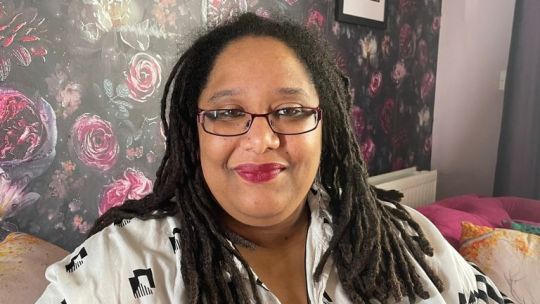
Helen Gould
Gender: Non binary (he/she/they)
Sexuality: Bisexual
DOB: N/A
Ethnicity: Black British
Occupation: Writer, professor, activist
#Helen Gould#qpoc#bisexuality#bipoc#lgbtq#non binary#bisexual#black#black british#poc#writer#teacher#activist#plus size
68 notes
·
View notes
Text

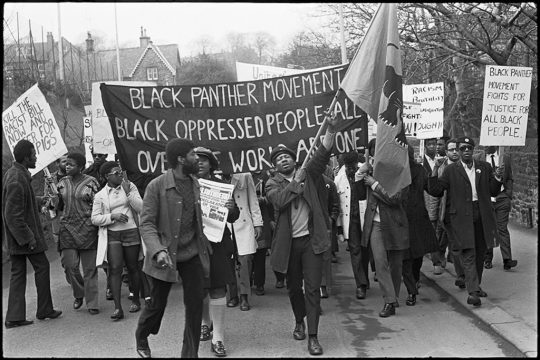

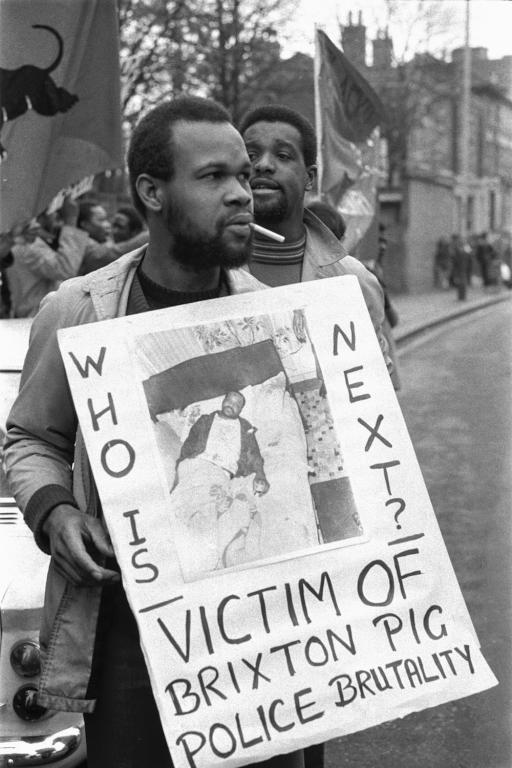
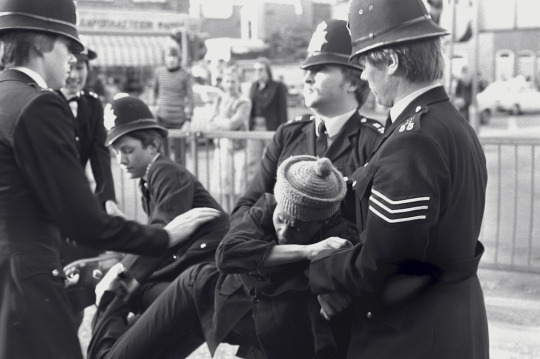
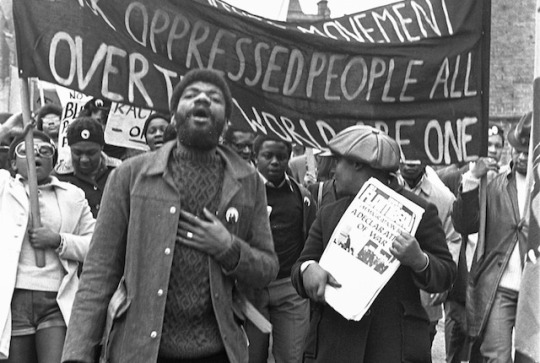
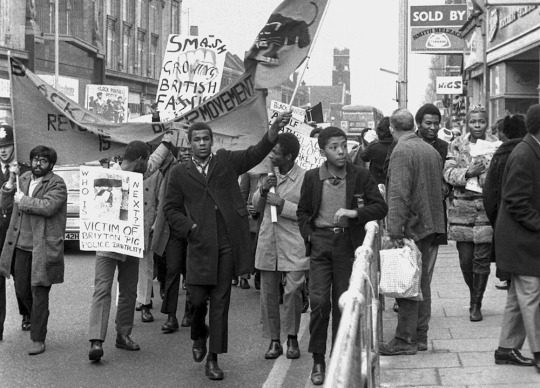
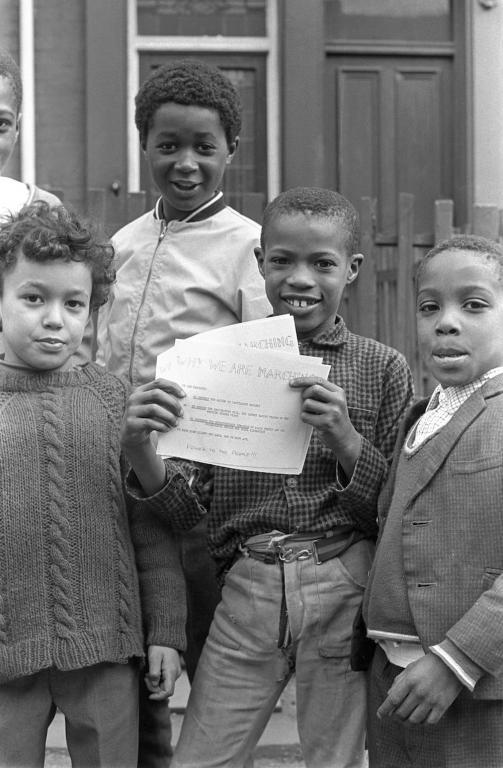

A collection of photos by Neil Kenlock of the British Black Panther party from 1968-1972.
#black history month#black history month uk#british black panthers#british black panther party#neil kenlock#black british#black british history#black panther party#british black history month#politics#helen speaks
33 notes
·
View notes
Text

Alex Scott: current TV pundit, former professional footballer, and one of four women who made over 140 appearances playing for England.
#lgbt#black lgbt#black queer notables#black lgbt women#lgbt women#black queer women#queer women of color#alex scott#alexandra virina scott#lgbt athletes#black british
13 notes
·
View notes
Text
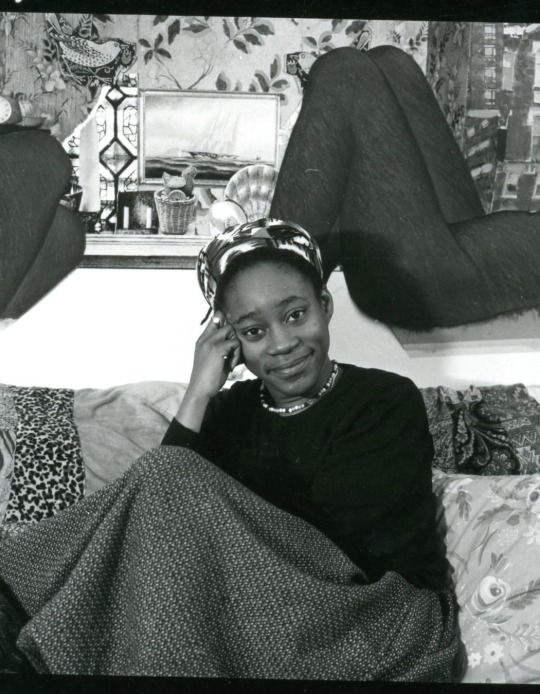
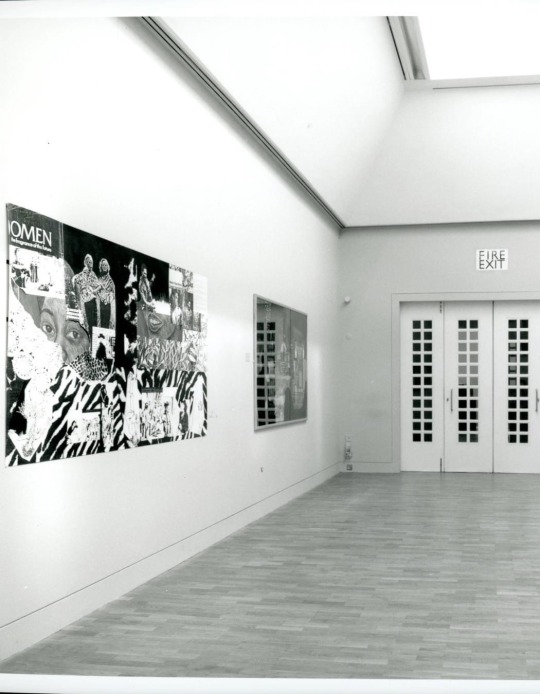
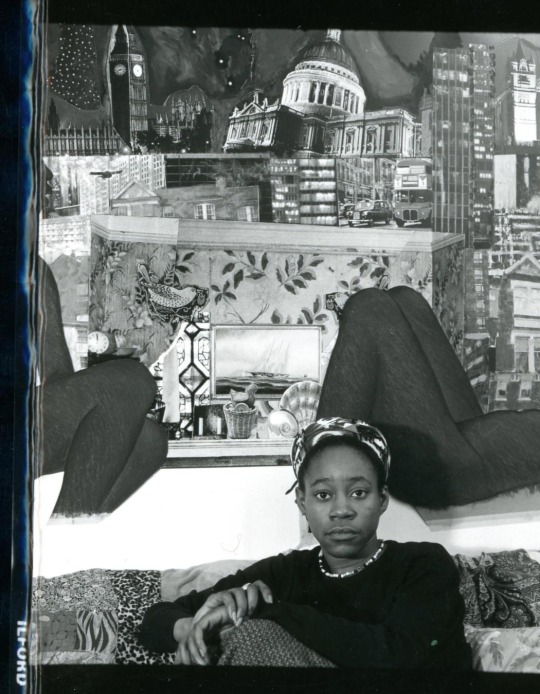
Sonia Boyce: portraits – during exhibition 1988 at Whitechapel Gallery, photo Sue Ormerod. Courtesy of Whitechapel Gallery Archive.
Art by Women - Women in Arts @abwwia
Dame Sonia Dawn Boyce DBE RA (#BornOnThisDay March 7, 1962) is a British Afro-Caribbean artist and educator, living and working in London. She is a Professor of Black Art and Design at University of the Arts London. Boyce's research interests explore art as a social practice and the critical and contextual debates that arise from this area of study. Boyce has been closely collaborating with other artists since 1990 with a focus on collaborative work, frequently involving improvisation and unplanned performative actions on the part of her collaborators. Boyce's work involves a variety of media, such as drawing, print, photography, video, and sound. Her art explores "the relationship between sound and memory, the dynamics of space, and incorporating the spectator". To date, Boyce has taught Fine Art studio practice for more than 30 years in several art colleges across the UK. Via Wikipedia
#SoniaBoyce #OnThisDay #artherstory #blackbritish #PalianShow
16 notes
·
View notes
Text
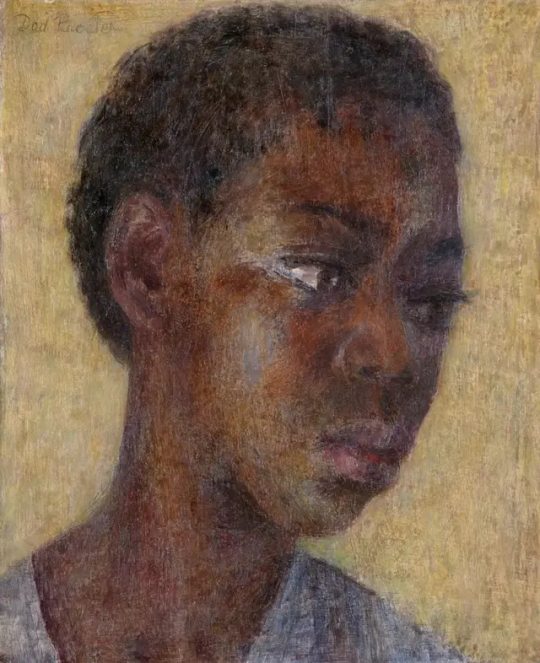
Jamaican Girl, ca. 1956-60
Dod Procter RA (1891 - 1972)
RA Collection: Art
Procter travelled widely, and had already visited Asia, Africa and North America before she began regularly visiting Jamaica during the 1950s. She painted many portraits of Jamaican children during her stays, including this portrait which the RA purchased after it was shown in the 1960 Summer Exhibition.
Procter painted Jamaican Girl in the late 1950s, at a time of increased tensions surrounding the growing black presence in Britain and increasing momentum towards Jamaican independence. None of this, however, is registered in the pensive face of Jamaican Girl.
#black woman#black beauty#beauty#natural hair#dark skin#black history month#british history#jamaican history#slavery#transatlantic slavery#human atrocity#delicate#dod procter#dod procter ra#black british#colonisation
43 notes
·
View notes
Text
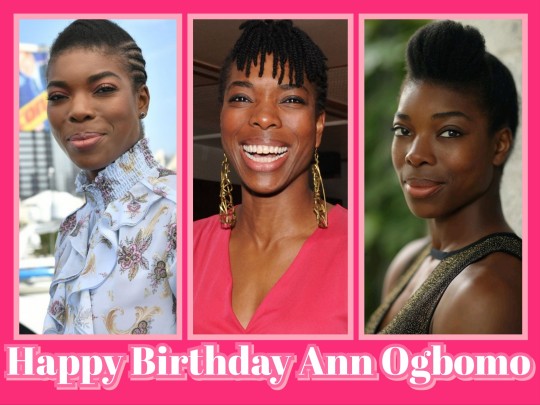
Ann Ogbomo: February 21, 1990
#Happy Birthday Ann Ogbomo#Ann Ogbomo#Happy Birthday#February Birthdays#February#Birthday Photosets#Nesha Photosets#Pink Aesthetic#Birthdays#celebrity birthdays#Flooding Your Dash with Black Lady Face#Flooding Your Dash with Dark Skin Beauty#Black Women in Entertainment#Black Actresses#British#international#black british
12 notes
·
View notes
Text

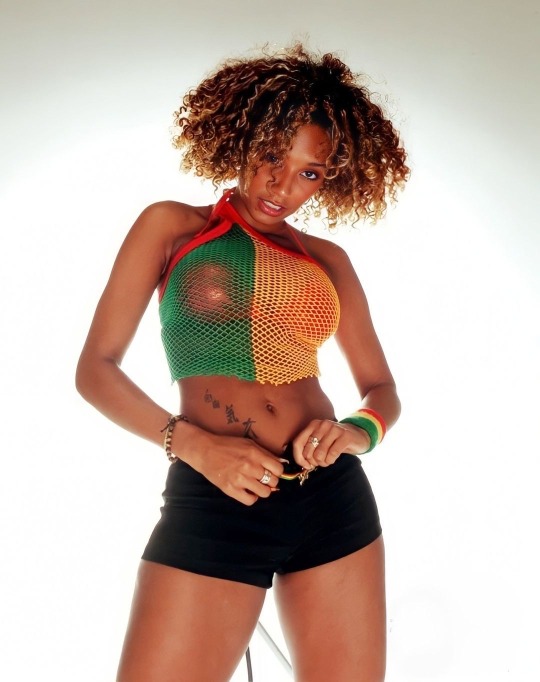
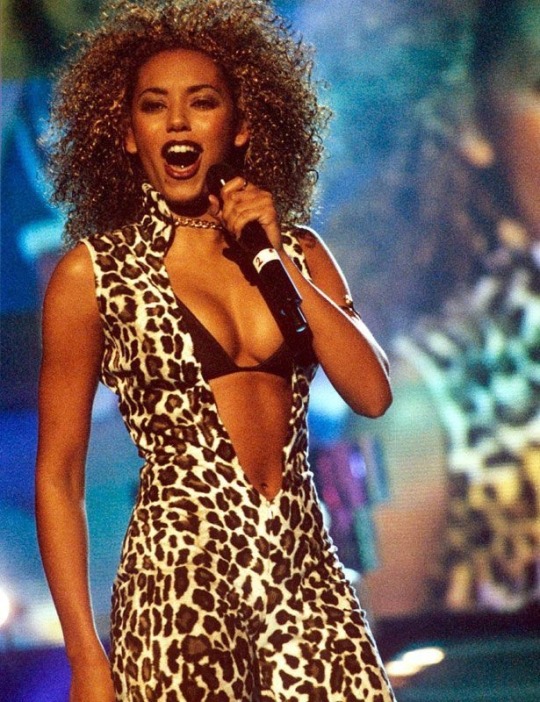
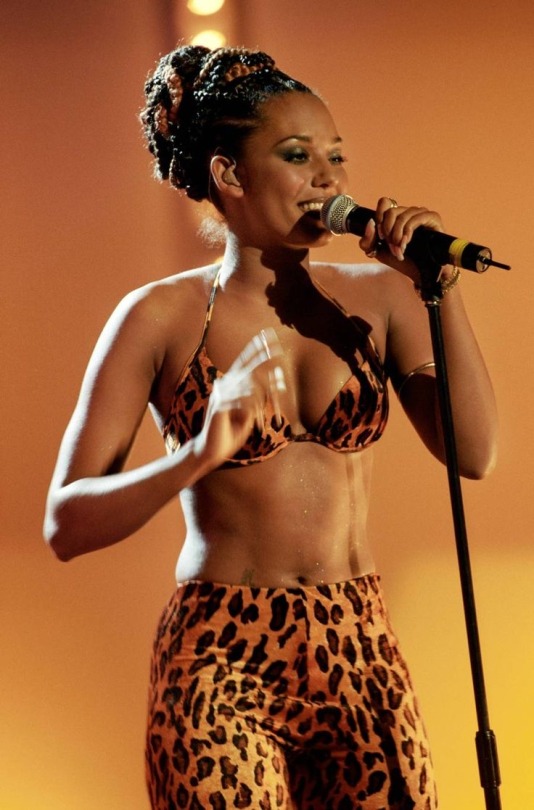

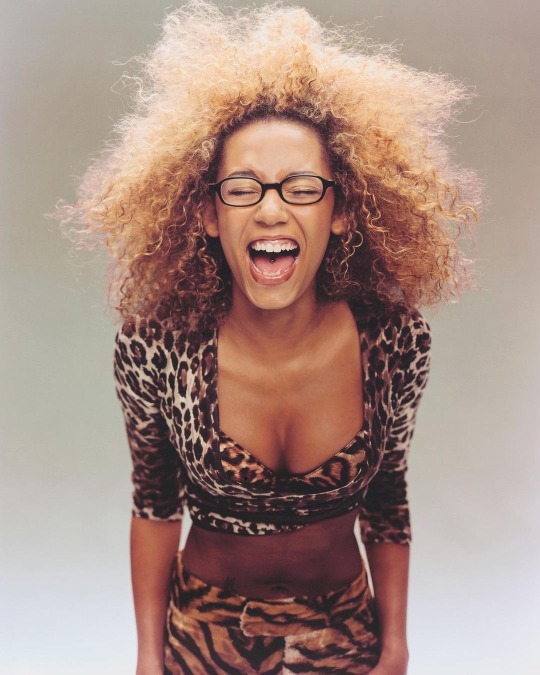
Mel B appreciation post. Born Melanie Brown in 1975 to an English mother and a father from Saint Kitts and Nevis.
113 notes
·
View notes
Text
hi if ur interested in black british poetry i really recommend looking into benjamin zephaniah!! he passed away recently at 65 and his life was so interesting. he was a dub poet, writer, vegan and anarchist (upon many other things like acting in peaky blinders.) he wrote poems about his life, beliefs, and british society for black people and spoke out about societal issues often. very cool guy in my opinion 👍 do check his stuff out

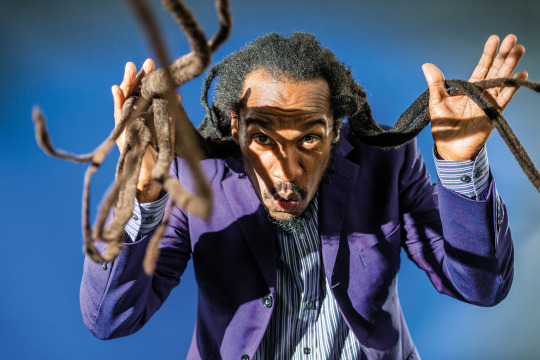
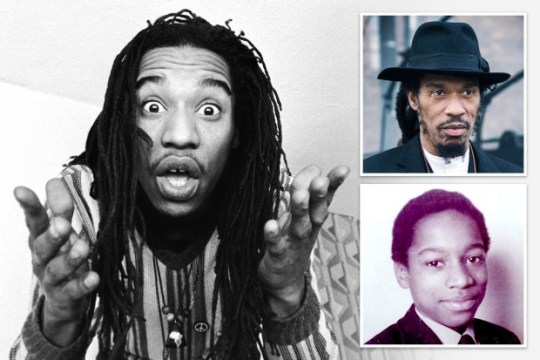
#he performs a lot of his poems and theyre up on youtube#i learnt about him at skl but theres a lot i never knew about him#like the fact that he was dyslexic#and a lot of people dont even know about him#vee chats#benjamin zephaniah#black poetry#poetry#not atsv related#black writers#black british
18 notes
·
View notes
Text
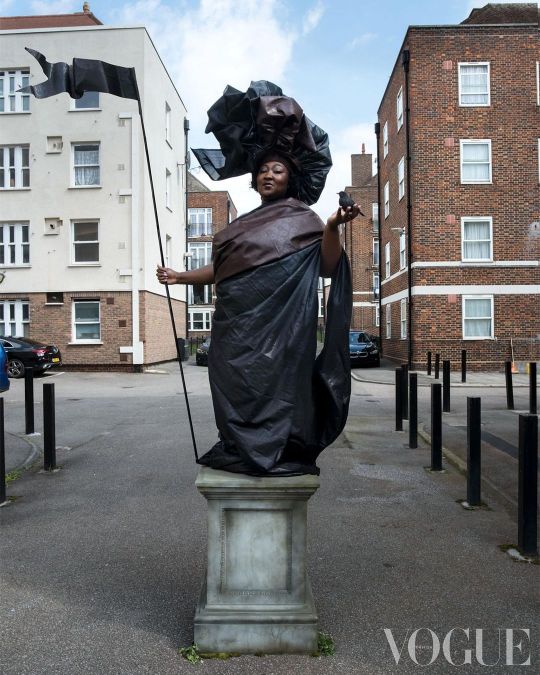
Lady Phyll by Tim Walker for Vogue UK's Pride Portfolio, July 2023 edition
Phyll Akua Opoku-Gyimah, 48, activist and cofounder of UK Black Pride.
Styled by Kate Phelan.
#tim walker#lady phyll#british vogue#vogue uk#vogue#lgbtq history#lgbtq+ pioneers#uk black pride#pride month#portrait photography#editorial#kate phelan#british photographer#queer artist#activist#black british#black model#black women#queer woc#july 2023#2023#black britain
20 notes
·
View notes
Text
Jodie Turner-Smith arrives at the GQ Men Of The Year Awards 2023



19 notes
·
View notes
Text
Part 3: How to write an MLE-based London accent authentically
Part 1: Who, What (London Accents) | Part 2: When, Where, Why (Black Londoner Culture since Windrush)
As I conclude this little guide, I'd like mention that my ask box and DMs are always open if anyone has further questions or anything 🤎
In this section, I'll go over some advice, the grammar and vocabulary and provide some suggestions for references.
Section A: Basic Tips
When to use slang
The concentration of slang is key to differentiating characters as well as writing an accent authentically. As an MLE-based speaker who is not actually a roadman (meaning a gangster, though many people misuse the term to refer to anyone who uses MLE, especially if they are working class), like most of us, Hobie does not utterly kill it with slang that would likely not be understandable to the people he’s with. There are a lot of phrases and idioms/metaphors that seem self-explanatory once you know what they mean or that seem similar to Americanisms (e.g. roadman = street/hood nigga), but of course, as someone who doesn’t use the terms, hearing it in passing, it probably wouldn’t be understandable, despite the speaker thinking it is.
Coming from a diverse place, often with immigrant parents who don’t even speak English as a first language, if fluently at all (not in the case of most black Caribbeans from former British colonies, but remember Asians and Africans are more plentiful here), trust me, we know what we sound like 😂! Most of us code-switch, as we learn standard English in school and, until more recently, where more people are 3rd gen+ immigrants as opposed to 2nd, we actually tend to pick up MLE slang from experiences outside the home as we grow up. At the same time, some people really don’t care at all and don’t change how they speak for anyone haha. I don’t recommend trying to write code-switching if you’re not extremely familiar with MLE because you’ll probably lose the flow and also, Hobie only eases up a little bit after his intro.
My point is though, that not every single sentence needs to have slang in it. Most should, but if you’re trying to be serious or sexy, for example, and you feel the need to tack on some slang just to convey Bri’ishness, even if it doesn’t really fit, don’t do it cause it’s no more authentic than just writing plain English in those scenarios.
When talking to people from his own dimension, however, slang it up if you’d like, because the expectation would be that a (working class or ethnic) Londoner would understand him.
For humour, mocking and teasing, we love to use slang because a lot of it is funny, even to us. Like I said, we know what we sound like. Those are the moments when more obscure slang (such as Cockney rhyming slang) might come out for comedic effect.
It’s good to have some balance, so not every word needs to be substituted. If you couldn’t read it without a fucking huge glossary, you’ve probably done a bit too much.
Writing the Accent
It’s good in moderation. ‘Luv’, ‘ain’t’, replacing the last g with an apostrophe in -ing words - you all have those things down, it works, good job.
HOWEVER, it is very clear that a lot of you have no clue what letters we do and don’t drop/change and in what words, as well as a lot of you going OT with removing the T’s from the middle of words. I know it kind of sounds like that to you but it reads like an over-exaggeration or mockery, particularly because most London accents, including Hobie’s, are much lighter in comparison to Brits from other areas, in which such omissions and alterations of letters would be somewhat appropriate but still, in moderation. I don’t recommend typing out the accent often, just sprinkle it around for a bit of flavour but don’t consistently write in that way because your writing loses legibility and it gets quite distracting.
Content
The stereotype of British people liking sarcasm is true for most and, in general, we like to have, what we call, ‘a bit of banter’. We’re a jokey people, even if those jokes can be a bit harsh or teasing. Confusingly, even if we are joking around, it doesn’t mean necessarily we’re being friendly, joking is just how we communicate (e.g. “Oh boy, humbling reality Spider-Man has arrived”, “What does that do?” “Apart from having a great name?”, “super humane and not creepy”, “this is a great look…”). I think most people have got this down really well, so keep it up guys 😎🤙
Another thing is cussing, swearing, profanity, whatever you wanna call it. We do it a lot for no reason, mainly spamming the word “fuck(ing)”. So have fun with that if you aren’t already.
We’ll get into it more in the terms of endearment section of Section B but, basically a lot of Londoners are typically not too mushy or affectionate, as is the stereotype for big city people and, additionally, British people in general aren’t the most direct in their words. Obviously, some people are but it’s not the culture if you’re trying to write proper ‘authentic’ haha. For a lot of us, saying sweet stuff can be quite laborious when sincere or cheesy or confrontational levels of direct really 😂 We ain’t the friendliest of types through our words so I'd recommend relying more on context for the sweet factor unless it's a stand-out moment.
Different parts of the UK, even within England itself, have different slang
Idk what else to say about this but yeah, there’s some phrases I’ve seen people use that have me scratching my head cause “nobody [from my area] says those words in that order” but I’m guessing it’s down to people incorporating slang which is more commonly heard up North because it’s all classed as British/U.K. slang when you look it up so, just be wary of that.

Section B: Grammar and Vocab (the thing you’ve been waiting for 😂)
I’ll link a document here so I don’t clog up your dash more than I already have. Feel free to bookmark it or anything, I’ll update it if needed. The contents are links to the relevant section so you can just click those if you’re not trying to read the whole thing.
I only included some highlights of the things that are easy enough to explain just by writing them out with their meanings but it’s by no means an extensive list. I’ve studied a few languages but I’m not a linguist so I just did my best.
If you want to go more heavy with the Cockney slang, I’ll leave it to someone who’s more familiar with it (or not… lol) to explain those terms and when to use them properly.

Section C: References
Of course, it’s all good and all that I’ve given you instructions but to make it sound natural, you’d need a point of reference. Here are some references of black North West Londoners from the early 80s, black East Londoners, black Londoners more generally and a Daniel Kaluuya interview so you can get a better feel of how we sound:
Clip from ‘No Problem’, the first Black British Sitcom
youtube
The accents within this one group of siblings is very varied and none of them use MLE, as per the time period. The two younger sisters have accents most similar to Hobie’s. The show follows a group of siblings of Jamaican descent living in a council house in North West London, first released in 1983.

Clips from ‘Chewing Gum’ by Michaela Coel [CW: they're awkwardly talking about sex in a lot of the clips + don't listen to Candice's boyfriend, Aaron, he's not from London lol]
youtube
youtube
youtube
The show takes place in Tower Hamlets, which is in East London and was first released in 2015. Tracy has a similar accent to Hobie and also uses a mix of more general/Cockney-influenced slang and MLE, so this one should both be a fun watch and be useful, you’ll also want to pay attention to Candice who has a more MLE lean to her speech.

Clips from the Foot Asylum crew most of them are MLE speakers, see some examples of our banter with friends lol

Clips from ‘Top Boy’
youtube
youtube
Another show that takes place in East London, this time in Hackney, which is an area known for being kind of rough in terms of gang activity. Almost all the characters speak exclusively MLE in this show. If you want to watch it, TW for violence and gang activity, death, etc. (18+). You can tell based on the ones I’ve chosen that Sully’s my favourite character lmao.
Fun fact, as you might hear the character, Dushane, reference, Sully lives on a canal boat for a while as a form of refuge. I know a bit about boat dwellers in London from a lecture at uni but if anyone wants me to do more research and do a post and explain the waterways and stuff, again, feel free to drop an ask and I’ll do it :)

Clip from ‘Love Island’ just pay attention to the black islanders, Tyrique and Whitney
youtube
I just finished watching this year's Love Island UK so I thought I’d throw the clip of Whitney, Lochan and Tyrique fighting in here lmao

& Daniel Kaluuya talking about Spiderpunk to bring us full circle✨
youtube
#hobie brown#atsv fanfiction#spider punk#black british#writing advice#across the spiderverse#shui fic#shuinami
103 notes
·
View notes